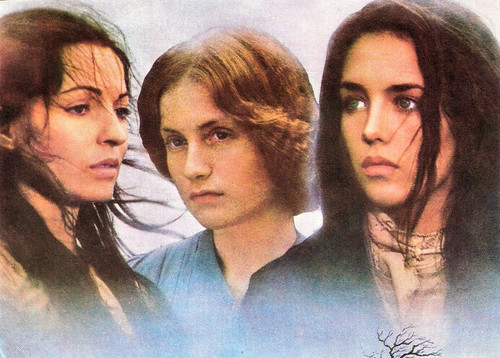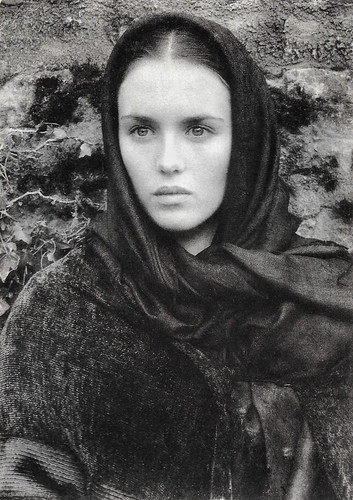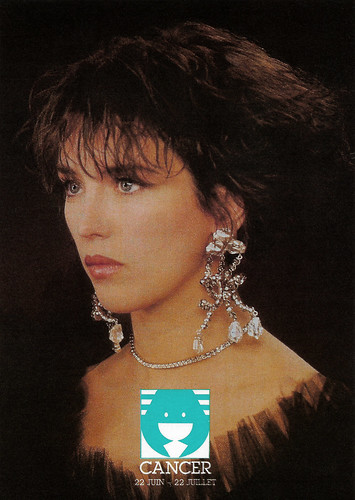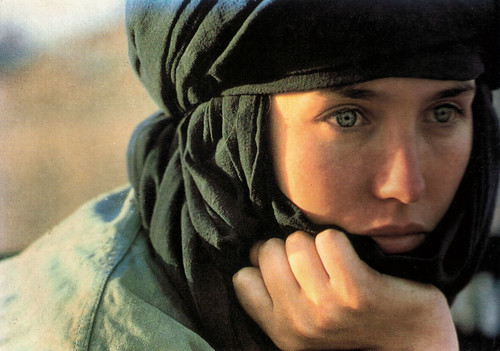
French postcard by Editions F. Nugeron, no. 22.

French postcard by Editions La Malibran, Paris, no. CF 43, 1991. Isabelle Adjani and François Truffaut in L'histoire d'Adèle H./The Story of Adèle H. (François Truffaut, 1975).

Romanian postcard by Casa Filmului Acin. Photo: publicity still for Les soeurs Brontë/The Bronte Sisters (André Téchniné, 1979) with Marie-France Pisier as Charlotte Bronte, Isabelle Huppert as Anne Bronte, and Isabelle Adjani as Emily Brontë.

French postcard in the Collection Cinéma Couleur by Editions La Malibran, Paris, no. MC 25. Heinz Bennent and Isabelle Adjani in Possession (Andrzej Zulawski, 1981).

French postcard in the série acteurs by Les Editions GIL, no. 5. Isabelle Adjani in L'Été Meurtrier/One Deadly Summer (Jean Becker, 1983).
French postcard by Ebullitions, no. 571.
French postcard by Humour a la Carte, Paris, no. ST-158.
The intense, unstable, love-obsessed Adèle Hugo
Isabelle Yasmine Adjani was born in the immigrant neighbourhood Gennevilliers in Hauts-de-Seine, a suburb of Paris, in 1955. Her father, Mohammed Cherif Adjani was Algerian. He was a soldier in the French Army in World War II. Her mother Augusta, called 'Gusti', was German. Isabelle grew up bi-lingual, speaking German and French fluently.
After winning a school recitation contest, she began acting in amateur theatre by the age of twelve. At the age of 14, she starred in her first motion picture Le Petit bougnat/Little Bougnat (Bernard Michel, 1970), while on summer vacation. She made her second film, the coming-of-age drama Faustine et le bel été/Faustine and the Beautiful Summer (Nina Companeez, 1971), also while she was still at school.
In 1972, the 17-year-old joined the prestigious Comédie française as the youngest company member ever. There she gained fame as a classical actress for her interpretation of Agnès, the main female role in Molière's 'L'École des femmes' (The School For Wives). After only two years she left the Comédie française, to pursue a film career. She played minor roles in several films and enjoyed modest success as the spoiled teenage daughter of Lino Ventura in La Gifle/The Slap (Claude Pinoteau, 1974). She won the prestigious Prix Suzanne Bianchetti for Most Promising Actress.
The following year, she landed her first major role as the mentally unbalanced daughter of author Victor Hugo in L Histoire d Adele H./The Story of Adèle H. (François Truffaut, 1975). Critics were enthused over her performance as the intense, unstable, love-obsessed Adèle Hugo. She was nominated for the Best Actress Oscar and received offers for roles in international films. For André Téchiné, she co-starred with Gerard Depardieu in Barocco (1976), as the instigator of a plot to blackmail a politician, and in Les Soeurs Bronte/The Bronte Sisters (1978), as Emily Bronte.
In Roman Polanski's psychological thriller Le Locataire/The Tenant (1976), Adjani was the suicidal former occupant of the apartment rented by a confused man (Polanski himself). In Hollywood, she played a gambler opposite Ryan O’Neal in the crime thriller The Driver (Walter Hill, 1978). She then portrayed Lucy in the Horror film Nosferatu/Nosferatu the Vampyre (Werner Herzog, 1979), a retelling of the Dracula legend featuring Klaus Kinski. In 1980 she had a son, Barnabé Nuytten with Flemish cinematographer Bruno Nuytten.

French postcard by Editions La Malibran, Paris, 1989. no. CF 58. Isabelle Adjani in Les soeurs Brontë/The Brontë Sisters (André Téchiné, 1979).

French postcard by Especially for you, no. 9.
French postcard by Humour à la Carte, Paris, no. 3473. Photo: D.R.
French postcard by Ebullitions, no. 632.
French postcard by Humour à la Carte, Paris, no. ST 73. Photo: D.R.

French postcard in the Collection Cinéma by Star, Neuilly.
Tour de force performance
In 1981, Isabelle Adjani received a double Best Actress Award at the Cannes Film Festival for her part as the impoverished mistress of Alan Bates in Merchant-Ivory's Quartet (James Ivory, 1981), and for her role as the unfaithful wife of Sam Neill, struggling with demons in the Horror film Possession (Andrzej Zulawski, 1981).
Yuri German at AllMovie: “Filmed amidst the oppressive backdrop of the Berlin Wall by the expatriate Polish director Andrzej Zulawski (who was unable to work in his homeland after too many clashes with the authorities), the picture is so relentlessly intense and so deliberately esoteric, that most viewers would find it too hard to connect with. Still, its symbolism, its unbridled and flashy directorial style, and the tour de force performance by Isabelle Adjani earned this unique tale a cult following in Europe.”
The following year, she received her first César Award for Possession. In 1983, she won the César again, now for her depiction of a vengeful woman in the blockbuster L'Été Meurtrier/One Deadly Summer (Jean Becker, 1983). That same year, she released the French pop album 'Pull Marine' written and produced by Serge Gainsbourg. She starred in a music video for the hit title song 'Pull Marine', which was directed by Luc Besson.
For the then 26-year-old Besson, she also starred in the successful comedy thriller Subway (Luc Besson, 1985) opposite Christophe Lambert. From 1986 to 1987, Adjani was romantically linked to actor Warren Beatty with whom she co-starred in the commercial failure Ishtar (Elaine May, 1987).
In 1988, she co-produced and starred in a biopic of the sculptor Camille Claudel (Bruno Nuytten, 1988), the mistress of August Rodin (Gerard Depardieu). As she had done in her portrait of Adele Hugo, Adjani fully conveyed the passion and spirit of a strong-willed woman who descends into madness. She received her third César, a second Oscar nomination and a Berlin Film Festival Best Actress Award for this role. Following this publicity, she was chosen by People magazine as one of the '50 Most Beautiful People' in the world.

French postcard in the Signes du Zodiaque series by Editions F. Nugeron, no. 1. Caption: Cancer (22 Juin - 22 Juilliet).
French postcard by Ebullitions, no. 26.
French postcard by Ebullitions, no. 17. Photo: publicity still for L'Été Meurtrier/One Deadly Summer (1983) with Alain Souchon.

French postcard in the série acteurs by Les Editions Gil, no. 20. Photo: Isabelle Adjani in L'Été Meurtrier/One Deadly Summer (Jean Becker, 1983).

West German postcard by Christa Karten, Berlin, no. 113. Isabelle Adjani in L'Été Meurtrier/One Deadly Summer (Jean Becker, 1983).

French postcard by Editions F. Nugeron, no. 6. Photo: Collection de l'École de Cinéma Camiris, Lyon. Isabelle Adjani in Ishtar (Elaine May, 1987).
A galaxy of fragile women
Isabelle Adjani won her fourth César for the ensemble epic La Reine Margot/Queen Margot (Patrice Chéreau, 1994), based on Victor Hugo's novel. The film provided her with another portrayal in her galaxy of fragile women surrounded by violence. She had a relationship with Daniel Day Lewis from 1989 to 1995. He left her during her pregnancy with their son, Gabriel-Kane Day Lewis, who was born in 1995. The following year, she was teamed with Sharon Stone for Diabolique (Jeremiah S. Chechik, 1996), a remake of the classic psychological thriller Les Diaboliques by Henri-Georges Clouzot. Adjani again seemed out of her element as the meek, sickly wife of a belligerent school headmaster (Chazz Palminteri).
Sandra Brennan at AllMovie: “She also continued to be highly visible on the political scene, staunchly supporting Algerian rebel activities and actively fighting racism against North African immigrants (such as her father) in France. She was particularly outspoken concerning the activities of the French National Front. In 1986, the anti-immigration group organised a smear campaign against her, starting rumours that she was dying of AIDS. This actually resulted in newspaper reports of Adjani's death, which caused her to go on national television to prove that she was, in fact, still alive.”
In 2000, she made a rare stage acting appearance in the title role of a Parisian production of La Dame aux Camelias (Camille). After a five-year hiatus, Adjani returned to the screen starring in La Repentie/The Repentent (Laetitia Masson, 2002) with Samy Frey. The following year she appeared in the drama Monsieur Ibrahim et les fleurs du Coran/Monsieur Ibrahim (François Dupeyron, 2003) featuring Omar Sharif, and assumed a role originally meant for Sophie Marceau in the black comedy Bon Voyage (Jean-Paul Rappeneau, 2003). Adjani was engaged to composer Jean Michel Jarre, but they broke up in 2004.
She won her fifth César for her role as a troubled and emotionally fragile woman at the centre of a firestorm in the psychological drama La journée de la jupe/Skirt Day (Jean-Paul Lilienfeld, 2008). In 2009, she denounced statements by Pope Benedict XVI claiming that condoms are not an effective method of AIDS prevention. Adjani was made a Chevalier de la Légion d’honneur in 2010. In the social comedy Mammuth (Benoit Delépine, Gustave de Kervern, 2010) she played the phantom of Gérard Depardieu's first love. She lent her voice to the character of Mother Gothel in the French language version of the Disney computer-animated film Tangled (Nathan Greno, Byron Howard, 2010), loosely based on the German fairy tale 'Rapunzel' in the collection of folktales published by the Brothers Grimm.
In 2011, Isabelle Adjani co-starred with former soccer player Eric Cantona in the action film De force (Frank Henry, 2011). She embodied the commander Clara Damico, head of the brigade for the repression of banditry. In 2014, she played one of eleven female roles in actress Audrey Dana's choral film Sous les jupes des filles (2014), alongside Laetitia Casta and Vanessa Paradis among others. The film, which she accepted in order to help the director make her first feature film, was a box-office success, attracting over 1,300,000 cinema-goers. Adjani played the title role in the social thriller Carole Matthieu (Louis-Julien Petit, 2016) as a female company doctor who disagrees with the moral harassment and humiliation practised against her employees by the company that employs her. In 2023 Adjani joined the Netflix miniseries Perfect Couple.

Romanian postcard by Casa Filmului Acin. Isabelle Adjani in L'histoire d'Adèle H. (François Truffaut, 1975).

Romanian postcard by Casa Filmului Acin.

Romanian postcard by Casa Filmului Acin.

Romanian postcard by Casa Filmului Acin.

Romanian postcard by InterCONTEMPress. Photo: Isabelle Adjani in Camille Claudel (Bruno Nuytten, 1988).

French postcard by Télérama. Photo: Patrick Swircx / Corbis Outline. Caption: Télérama, the French cultural weekly. Every week, Télérama opens its pages to photographers.

French postcard by Télérama. Photo: Patrick Swirc.
Trailer for Nosferatu/Nosferatu the Vampyre (1979). Source: Danios12345 (YouTube).
Trailer for Possession (1981). Source: TheCultBox (YouTube).
Sources: Yuri German (AllMovie), Sandra Brennan (AllMovie), Yasmine (IMDb), Yahoo! Movies, Wikipedia and IMDb.
No comments:
Post a Comment